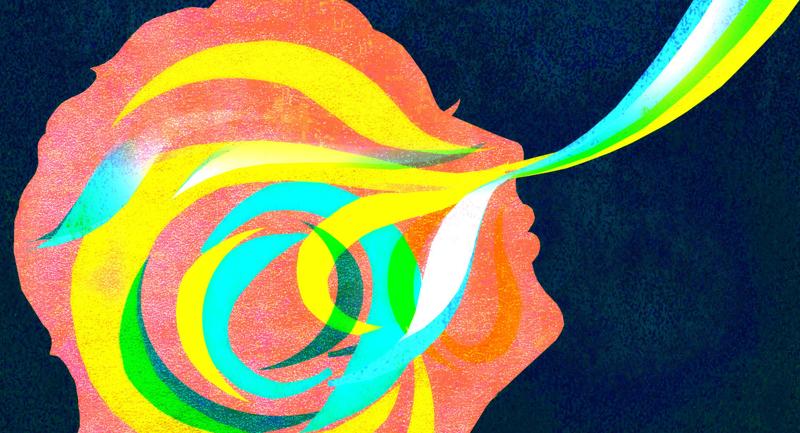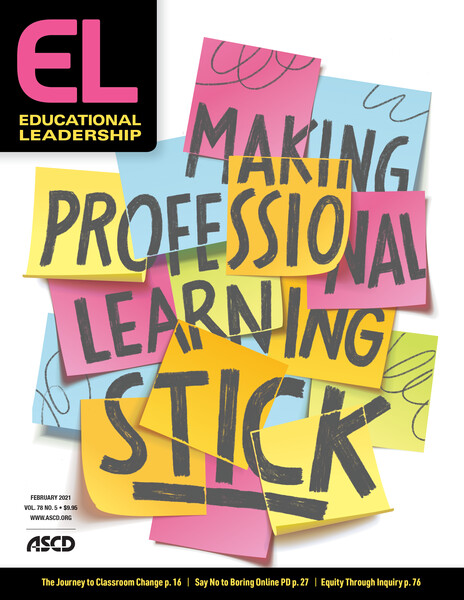As schools continue to recover from the tragedy of a global pandemic, they can look to new opportunities emerging amidst the trauma and grief. These opportunities include a return to the primacy of relationships among adults and students, the abandonment of ineffective practices such as inspirational monologues without meaningful interaction, and dramatic improvements in professional learning. To realize the latter, educators need to drive toward five transformations in professional learning. Although we have long known the inadequacies of traditional approaches to PD, the constraints imposed on schools by the pandemic create a sense of urgency that should make us intolerant of such ineffective practices.
Professional learning is hard work and takes time. While it doesn't have to be onerous and dreary, the idea that learning can and even should be fun and entertaining is inconsistent with the evidence. Researchers have debated the logic behind the "10,000 Hour Rule" popularized by Malcolm Gladwell and challenged by many others (Ericsson & Pool, 2016), but it would be impossible to find evidence that three-hour workshops or 90-minute keynotes on their own, however popular and entertaining, result in learning or changes in professional practices. A review of the research on practices that lead to learning (Killian, 2019) noted that deliberate practice—practice that is motivated by a compelling desire to improve, requires extra effort, is sustained over a long period of time, and is accompanied by feedback—can result in significant gains in learning for adults and students. This kind of learning simply can't happen in a drive-by workshop or presentation.
The feedback typically associated with these events has more to do with the food, temperature of the room, and the speaker's sense of humor than what the participants actually learn. If we aspire to be a learning profession, then we will stop conflating entertainment and soothing affirmations with the difficult cognitive and emotional challenges of professional learning and changes in practice.
Personalized learning is a common aspiration for students, yet adult learning remains astonishingly homogenous. The passive voice is pervasive and intentional in the phrase, "all the teachers were trained," having been fed the same diet regardless of their needs. While pre-assessment is a vital and common part of personalized learning for students, it is rare for faculty members and administrators to be offered the opportunity for a pre-assessment before they are marched into the auditorium to receive the message of the day—perhaps an inspirational speech about the importance of personalized learning. This is reminiscent of the practice among universities to require that doctoral candidates studying collaborative learning write their dissertations entirely alone.
If we are to practice the personalization that we preach, then every faculty member will have a professional learning profile that shows current knowledge and skills, immediate and long-term professional learning needs, and the ability and willingness to support colleagues in critical skill areas. In the summer of 2020, I interviewed senior district leaders about the amount of time it takes for teachers and administrators to fully learn to use and successfully apply their technology programs for lesson delivery, assessment, grading, attendance, and behavior—all vital skills in virtual and blended learning environments. The jaw-dropping answer was three years.
While many schools delivered laptops, tablets, and Chromebooks in a matter of weeks after closing in March of 2020, leaders soon learned that the delivery of hardware does not automatically lead to effective teaching and learning. The "learn to be a pilot while the plane is flying" approach might have been necessary in the spring of 2020; but it is indefensible in 2021. Teachers and administrators need comprehensive and personalized assessment, training, and continual support. The best way I have seen this delivered is not through one-size-fits-all workshops, but one-to-one coaching support. Every day spent in a workshop that is not tailored to meet the needs of the individual professional is a day that could have been devoted to addressing immediate and specific learning requirements.
Who doesn't love inspiration? I know I do. As a teacher and leader, I've done my best to inspire others. But inspiration without action leads to cynicism, undermining the very hope that inspirational words sought to generate. For example, as schools focus on equity amidst a global cry for racial justice, professional learning can take two strikingly different paths—feelings or actions. The notion that feelings and beliefs must precede changes in actions and practices is unsupported by the evidence (Guskey, 2020). On the contrary, behavior often precedes belief.
If we aspire for more equitable practices from the classroom to the central office, we dare not wait for feelings to emerge over time. It is, to be blunt, unlikely that a person with racist tendencies will emerge from a workshop on white fragility (DiAngelo & Dyson, 2018) with changed practices, no matter how abundant their tears (Bergner, 2020). On the other hand, when schools change inequitable practices, such as toxic grading practices (Reeves, 2020a), they can have an immediate and positive impact on equity. The feelings and attitudes may or may not follow, but the immediate imperative for equitable practices is now—not after the elusive and often illusionary buy-in of staff.
I have never seen anyone evaluated into better performance, and there is ample evidence that prevailing evaluation systems are expensive, ineffective, and counterproductive (Marshall, 2019). By contrast, coaching—the collaborative process of objective observation, immediate and specific feedback, followed by the application of that feedback for improved practice—has been used in professions as diverse as medicine, engineering, leadership, and teaching. Our understanding of effective assessment practices has advanced significantly over the years (Wiliam, 2014); we should apply that same evidence-based discipline to teacher evaluations.
Effective assessment that is destined to improve learning and professional practices should occur throughout the year with multiple and objective observations, immediate and personal feedback, and an immediate response to that feedback. Yet evaluation systems remain mired in the annual drill of end-of-year paperwork and the charade of evidence demonstrating that, along with more the 99 percent of their colleagues, the recipient of the evaluation is effective. As time is inherently a zero-sum game, every hour devoted to this pointless evaluation drill is an hour that could have been devoted to coaching and supporting teachers and leaders throughout the year.
During the recent school closures caused by the global pandemic, many students lost at least a half a year of learning and some estimates suggest that learning losses far exceeded the length of time away from the classroom (Kuhnfeld & Tarasawa, 2020). Nevertheless, not a single state has retreated from the fantasy of academic content standards that were designed on the premise that every student is on grade level—and needs no remediation or reteaching of skills and knowledge. While many states suspended annual testing, there has been no reduction of the expectations that teachers cover all grade-level standards. That was preposterous before the pandemic and remains doubly so today. It leaves teachers in an impossible position, attempting to engage in frantic and fragmented "delivery" of content rather than focused learning experiences. School leaders also face the temptation of fragmentation, as federal funds associated with pandemic relief have frequently been used to purchase one program after another. This leaves schools buried under the weight of initiative fatigue (Reeves, 2020b).
This final transformation, from fragmentation to focus, is one on which all other transformations depend. Rather than covering dozens of discrete content objectives and performance standards, teachers must focus on the essentials—what I have called "power standards." These are the standards that have leverage in multiple disciplines, recur in one grade after another, and are most essential for the next level of learning. The political process of setting standards is one of accumulation and ultimate ambiguity. The educational process of setting standards, by contrast, must be one of focus and clarity.
Similarly, leaders must avoid risking initiative fatigue, no matter how enticing and well-intentioned the program providers are. No grant, no technology, no program, and no initiative can give you another hour in the day. The essential task of the leader is to say no to every temptation that fragments the time, attention, and energy of students and teachers.
Beyond the Suffering
The lessons learned from the global pandemic must be worthy of their costs. The costs in human lives, in emotional devastation, in frayed relationships, in economic calamity, and in lost learning continue to be tallied. We owe it to those who have suffered to learn from this crisis and to apply its lessons so that we improve outcomes for the students we serve and for every professional in the education system.







